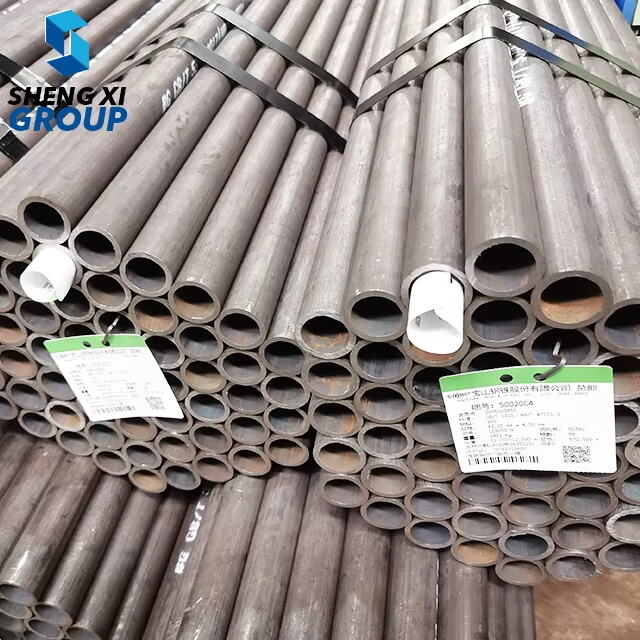Kugellagerstahl in der Automobilherstellung
Kritische Rolle bei Motordelen
Die Qualität des Lagerstahls macht den Unterschied, wenn es darum geht, wie lange Motorbauteile halten und wie zuverlässig sie sind, insbesondere für Komponenten wie Kurbelwellen und Nockenwellen in Verbrennungsmotoren. Motorenbauer benötigen Materialien, die extremen Hitze- und Druckbedingungen standhalten – genau hier liegt die Stärke von hochwertigem Lagerstahl. Wenn Hersteller hochwertigen Lagerstahl für ihre Bauteile verwenden, halten diese Teile in der Regel deutlich länger als billigere Alternativen. Branchenstudien zeigen, dass Fahrzeuge, die mit sorgfältig ausgewähltem Lagerstahl ausgestattet sind, tatsächlich etwa 10 Prozent besseren Kraftstoffverbrauch aufweisen als Standardmodelle. Dabei geht es jedoch nicht nur darum, Geld an der Tankstelle zu sparen. Bessere Materialauswahl wirkt sich direkt darauf aus, wie umweltfreundlich ein Fahrzeug über seine gesamte Lebensdauer wirklich ist. Somit sind durchdachte Materialentscheidungen entscheidend für Leistung und ökologische Verantwortung in der modernen Automobilproduktion.
Verbesserung der Übertragungssystemeffizienz
Wenn Lagerstahl in Getriebesysteme eingebaut wird, verbessert sich die Effizienz der Kraftübertragung deutlich. Das Ergebnis? Sanftere Schaltvorgänge und weniger Energieverlust während des Betriebs. Besonders wertvoll macht diesen Werkstoff für Getriebe seine Fähigkeit, wiederholten Belastungen standzuhalten, ohne sich abzunutzen – und damit die langfristige Zuverlässigkeit komplexer Mechanismen über Jahre hinweg sicherzustellen. Auch die Wahl des richtigen Lagerstahls spielt eine große Rolle. Studien zeigen, dass die richtige Auswahl die Lebensdauer des Getriebes um rund 15 % verlängern kann, wobei die Ergebnisse je nach Einsatzbedingungen variieren. Diese Vorteile können täglich in unzähligen Fahrzeugen auf unseren Straßen beobachtet werden. Getriebekomponenten, die ständiger Beanspruchung – vom Stadtverkehr bis zur Autobahnfahrt – ausgesetzt sind, halten einfach länger, wenn sie aus hochwertigem Lagerstahl gefertigt sind. Für Automobilhersteller, die langlebige und zugleich agil reagierende Fahrzeuge konstruieren möchten, ist der Einsatz dieses Materials eine kluge ingenieurstechnische Entscheidung, die sich sowohl in der Zuverlässigkeit als auch in der Kundenzufriedenheit auszahlt.
Anwendung von Kugellagerstahl in der Luft- und Raumfahrt
Leistung von Flugzeugmotoren
Die richtige Art von Wälzlagerstahl macht einen großen Unterschied, wenn es darum geht, das Maximum aus Flugzeugtriebwerken herauszuholen. Grundsätzlich reduzieren diese Materialien die Reibung innerhalb der Motorkomponenten, was bedeutet, dass Flugzeuge während des Fluges weniger Treibstoff verbrauchen. Weniger Reibung führt langfristig zu echten Kosteneinsparungen für Fluggesellschaften, da der Betrieb eines Flugzeugs kein günstiges Geschäft ist. Verschiedene Arten von Wälzlagerstahl werden in Labortests auf Herz und Nieren geprüft, bevor sie für den Einsatz in Jet-Triebwerken zugelassen werden, bei denen die Temperaturen extreme Werte erreichen können. Die meisten Ingenieure würden jedem, der fragt, bestätigen, dass die Investition in Wälzlagerstahl mit guten Versch eigen schaft en absolut lohnenswert ist. Triebwerke halten länger zwischen den Überholungen, was bedeutet, dass es seltener zu unerwarteten Ausfällen kommt und weniger Zeit in Wartungshallen verbracht werden muss. Für kommerzielle Fluggesellschaften, die im globalen Wettbewerb zueinander stehen, zählt jede Stunde, die bei Reparaturen eingespart wird, letztendlich zu besseren Flugplänen und zufriedeneren Passagieren, die weltweit an den Gates auf ihre Flüge warten.
Landegestell-Dauerhaftigkeit
Das Fahrwerk bleibt für den sicheren Flugbetrieb absolut unverzichtbar, und Lagerstahl hat sich als entscheidendes Material erwiesen, um die Langlebigkeit für wiederholte Landungen sicherzustellen. Bauteile aus diesem speziellen Stahl bieten beeindruckende Festigkeit und leiten Stöße effektiv ab – ein entscheidender Faktor, wenn Flugzeuge nach langen Flügen landen. Ingenieure entwickeln diese Komponenten äußerst präzise, da sie wissen, dass bereits kleine Defekte zu erheblichen Problemen führen können. Auch Daten aus der Industrie bestätigen diese Sichtweise, indem sie zeigen, dass Flugzeuge mit modernem Lagerstahl-Fahrwerk im Allgemeinen während ihrer Einsatzzeit weniger häufig Wartung benötigen. Weniger Ausfälle bedeuten niedrigere Wartungskosten für Fluggesellschaften, während Passagiere von sichereren Flügen und einer gleichmäßigeren Leistung über verschiedene Flugzeugmodelle hinweg profitieren.

Erneuerbare Energiesysteme und Walzstahl
Rotorunterstützung von Windkraftanlagen
Windkraftanlagen benötigen hochwertigen Lagerstahl für ihre Rotortragwerke, da dieses Material allen Kräften standhält, die durch Windböen und mechanische Abnutzung entstehen, ohne sich dabei abzunutzen oder zu versagen. Die Zähigkeit und Festigkeit von qualitativ hochwertigem Lagerstahl sorgt dafür, dass die Bauteile länger halten und seltener ausgetauscht werden müssen, was Wartungszeiten und Kosten reduziert. Laut jüngsten Studien aus dem Bereich kann der Wechsel zu einer besseren Lagerstahlsorte die Leistung der Turbine tatsächlich um rund 20 % steigern. Was diesen Stahl so wertvoll macht? Er funktioniert auch unter extremen Druckbedingungen einwandfrei, unter denen minderwertige Materialien bereits beschädigt würden. Für Erneuerbare-Energien-Projekte, die ihre Ausbeute maximieren und Reparaturen minimieren möchten, ist die Investition in hochwertigeren Lagerstahl nicht nur vorteilhaft – sie ist für den langfristigen Erfolg in der Entwicklung grüner Technologien praktisch unverzichtbar.
Solarspurenmechanismen
Solar-Tracking-Systeme sind wirklich von hochwertigem Lagerstahl abhängig, da dieser es den Panels ermöglicht, präzise zu bewegen und selbst bei schlechtem Wetter stabil zu bleiben. Manche Arten dieses Stahls widerstehen zudem recht gut dem Rost, was bedeutet, dass sie länger im Freien halten. Studien zeigen, dass Solaranlagen mit richtig ausgewählten Lagerstahlkomponenten tatsächlich etwa 30 Prozent mehr Sonnenenergie gewinnen als solche ohne diese Teile. Eine solche Steigerung macht für Unternehmen, die in erneuerbare Energien investieren, letztendlich den entscheidenden Unterschied aus. Wenn man Verbesserungen der Effizienz und Umweltvorteile betrachtet, unterstreicht Lagerstahl immer wieder, warum er eine so wichtige Materialwahl für moderne Solartechnik darstellt.
Lagerstahl in der Industriellen Maschinenbau
Hochgeschwindigkeitsrobotik
Die Bedeutung von Lagerstahl in der Robotik lässt sich nicht überbewerten, wenn es darum geht, sicherzustellen, dass Maschinen präzise laufen und auch unter intensiven Bedingungen länger halten. Wenn Roboter dank hochwertiger Lager weniger Ausfallzeiten erleben, können sie stets auf höchstem Niveau arbeiten, ohne ständige Unterbrechungen. Die Robotik benötigt wirklich Materialien, die schwere Lasten verkraften und gleichzeitig stabil bleiben, auch wenn sich die Bewegungen schnell hin und her vollziehen. Roboterarme sind hierfür ein gutes Beispiel – einige Studien deuten darauf hin, dass der Wechsel zu Lagerstahl einer höheren Qualität tatsächlich die Arbeitsgeschwindigkeit dieser Arme steigern könnte, und zwar um etwa 20–25%, abhängig von der jeweiligen Konfiguration. Solche Verbesserungen summieren sich im Laufe der Zeit in Fertigungsumgebungen, in denen jedes Sekunde zählt. Die meisten Fabriken betrachten Investitionen in besseren Lagerstahl mittlerweile als praktisch unverzichtbar, wenn sie möchten, dass ihre Automatisierung mit den modernen Anforderungen an Produktionsgeschwindigkeit und Zuverlässigkeit mithält.
Präzisionsfertigungswerkzeuge
Für alle, die in der Präzisionsfertigung arbeiten, ist hochwertiger Lagerstahl nicht nur wünschenswert, sondern unerlässlich, wenn Maschinen über die Zeit genau bleiben und länger zwischen Austauschzyklen halten sollen. Was macht diesen Stahl so wertvoll? Nun, seine Zugfestigkeit hilft, Verschleiß an verschiedensten Fertigungsanlagen zu reduzieren, was bedeutet, dass Produktionslinien weniger Ausfallzeiten haben und eine höhere Ausbeute erzielen. Unterstützt wird dies durch reale Daten – Betrachtet man beispielsweise Fabriksaufzeichnungen, zeigt sich, dass Werkstätten, die auf richtig ausgewählten Lagerstahl umsteigen, allein für Schneidwerkzeuge etwa 15 % weniger für Reparaturen und Wartung ausgeben. Solche Einsparungen summieren sich schnell, besonders in Branchen, in denen jede Minute zählt. Kein Wunder also, dass kluge Hersteller auch bei knappen Budgets weiterhin in hochwertige Lagermaterialien investieren. Schließlich bedeuten zuverlässige Maschinen weniger Probleme und langfristig höhere Gewinne.
Innovationen in der Medizingerätetechnik
MRT-Geräte und Diagnosewerkzeuge
Die Art des Lagerstahls, der verwendet wird, macht den entscheidenden Unterschied für die Komponenten von MRT-Maschinen, da er die Lebensdauer beeinflusst und darüber entscheidet, ob sie während wichtiger medizinischer Untersuchungen zuverlässig funktionieren. Besonders vorteilhaft ist, dass Lagerstahl aufgrund seiner nichtrostenden Eigenschaften nicht so leicht korrodiert, was dazu beiträgt, auch in unterschiedlichen Krankenhausumgebungen eine gleichbleibend gute Leistung zu gewährleisten, wo es vor allem auf präzise Ergebnisse ankommt. Studien haben immer wieder gezeigt, dass Ärzte klarere Bilder und genauere Diagnosen erzielen, sobald die MRT-Geräte mit hochwertigeren Lagerstahlteilen ausgestattet wurden. Und ehrlich gesagt, möchte niemand Fehler in seinem Diagnosebericht. Deshalb sollten Krankenhäuser in hochwertige Lagerstahlsorten für ihre MRT-Systeme investieren, wenn sie sowohl eine verlässliche Funktionsweise als auch positive Patientenergebnisse auf lange Sicht sicherstellen möchten.
Zuverlässigkeit von chirurgischen Instrumenten
Die Qualität des Lagerstahls macht den Unterschied, wenn es um zuverlässige und präzise chirurgische Instrumente geht, die für erfolgreiche Operationen benötigt werden. Besonders hervorzuheben sind bestimmte Stahlsorten durch ihre hervorragende Verträglichkeit im Körperinneren, ohne Probleme zu verursachen, weshalb sie häufig in medizinischen Geräten eingesetzt werden. Wenn diese Materialien während einer Operation mit Geweben in Kontakt kommen, lösen sie keine unerwünschten Reaktionen aus und reduzieren so mögliche Komplikationen. Medizinisches Personal berichtet regelmäßig von weniger Problemen mit Instrumenten aus Lagerstahl, was letztendlich bessere Behandlungsergebnisse für Patienten bedeutet. Lagerstahl trägt nicht nur dazu bei, dass Instrumente länger halten und unter Belastung besser standhalten, sondern hilft auch aktiv dabei, Operationen sicher und effektiv zu gestalten – etwas, das jeder Chirurg erreichen möchte.
Anwendungen in Baumaschinen
Bagger-Tragwerksysteme
Die Art von Stahl, die für Lager verwendet wird, spielt eine große Rolle dabei, wie gut Bagger schwere Lasten bei Baustellen bewältigen können. Besonders an Lagerstahl ist seine Fähigkeit, harten Bedingungen standzuhalten, sodass Bagger auch bei rauem Gelände oder extremen Wetterbedingungen weiterhin reibungslos laufen. Industrieforschungen zeigen, dass hochwertiger Lagerstahl die Tragfähigkeit eines Baggers tatsächlich um etwa 10 % erhöhen kann, was sich deutlich auf die Maschinenleistung auswirkt. Wenn Baumaschinen dieses widerstandsfähige Material verbaut haben, bleiben sie funktionsfähig, egal wie rau das Arbeitsumfeld ist. Hochwertiger Lagerstahl ermöglicht es diesen Maschinen somit, den ständigen Anforderungen beim Graben und Erdbewegung Tag für Tag gerecht zu werden und während langwieriger Bauprojekte zuverlässig zu bleiben.
Kran-Hydraulikkomponenten
Bei Kränen spielt Lagerstahl eine entscheidende Rolle bei der Verstärkung von Hydraulikteilen, damit diese unter widrigen Bedingungen reibungslos laufen und länger halten. Entscheidend ist jedoch, wie gut er wiederholten Belastungen standhält, ohne zu versagen, wenn tagtäglich schwere Lasten auf Baustellen gehoben werden, bei denen die Ausrüstung die Arbeiter einfach nicht im Stich lassen darf. Kranführer wissen aus erster Hand, dass Maschinen mit hochwertigem Lagerstahl in ihren Hydrauliken weniger oft ausfallen und deutlich seltener repariert werden müssen als billigere Alternativen. Weniger Ausfälle bedeuten weniger Zeitverlust durch Wartezeiten auf Reparaturen und niedrigere Gesamtwartungskosten für Auftragnehmer. Auf realen Baustellen macht die Fähigkeit des Lagerstahls, all diese Belastungen zu verkraften, während er seine strukturelle Festigkeit behält, den Unterschied zwischen sicherer Arbeitsausführung und gefährlichen Ausfällen. Deshalb setzen die meisten renommierten Bauunternehmen trotz höherer Anfangskosten auf Lagerstahl.
Nebenachsen von Hochgeschwindigkeitszügen
Hochgeschwindigkeitszugachsen sind stark auf hochwertigen Lagerstahl angewiesen, da dieses Material die außergewöhnliche Festigkeit und Langlebigkeit bietet, die für moderne Eisenbahnbetriebe erforderlich ist. Wenn Hersteller in ihren Konstruktionen hochwertigeren Lagerstahl verwenden, reduzieren sie tatsächlich den Rollwiderstand auf den Gleisen, was einen großen Unterschied macht, um Höchstgeschwindigkeiten zu erreichen und gleichzeitig einen reibungslosen Betrieb aufrechtzuerhalten. Branchenberichte deuten darauf hin, dass der Wechsel zu hochwertigen Lagerstahlsorten die Zuggeschwindigkeiten um etwa 15 Prozent steigern kann. Schnellere Fahrten sind hierbei übrigens nicht der einzige Vorteil, denn reduzierte Reibung bedeutet auch weniger Energieverlust während des Betriebs. Für alle, die an der Entwicklung zukünftiger Schienenverkehrslösungen arbeiten, bleibt es unerlässlich, den richtigen Typ Lagerstahl in diese kritischen Achskomponenten einzubauen, wenn unsere Hochgeschwindigkeitsnetze sich kontinuierlich verbessern sollen.
Frachtwagen-Radmontagen
Bei der Beförderung von Gütern spielt Lagerstahl eine entscheidende Rolle bei der Herstellung der Radläufer für Güterwagen. Diese Bauteile müssen enormen Belastungen standhalten, die mit dem Schienenverkehr einherkommen, und Lagerstahl trägt dazu bei, dass alles reibungslos läuft, ohne allzu schnell auszufallen. Das Besondere an Lagerstahl ist seine Fähigkeit, den Verschleiß im gesamten Eisenbahnsystem deutlich zu reduzieren. Dadurch entstehen geringere Reparaturkosten und weniger Verspätungen durch Wartungsarbeiten. Verkehrsexpertenberichte zeigen, dass der Wechsel zu Rädern aus Lagerstahl tatsächlich die maximale Zuladung dieser Wagen erhöht. Güterunternehmen profitieren hiervon enorm, da sie schwerere Ladung transportieren können, ohne zusätzliche Fahrten einplanen zu müssen. Somit laufen ihre Operationen effizienter, und langfristig trägt dies auch dazu bei, den Güterverkehr auf der Schiene umweltfreundlicher zu gestalten.
FAQ-Bereich
Was ist Lagerraumstahl und warum ist er wichtig in der Automobilherstellung?
Kugel Lagerstahl ist ein Material, das für seine Stärke und Verschleißwiderstand bekannt ist, was es zu einem wichtigen Bestandteil von hochleistungs-fähigen Motorkomponenten und Getriebesystemen in der Automobilherstellung macht. Seine Verwendung erhöht die Haltbarkeit und Effizienz dieser Teile.
Wie verbessert Kugellagerstahl die Leistung von Flugzeugmotoren?
Kugellagerstahl verringert die Reibung in Flugzeugmotoren, optimiert den Kraftstoffverbrauch und senkt die Betriebskosten. Er gewährleistet eine zuverlässige Funktionsweise bei hohen Temperaturen, wie sie typisch für Flugzeugmotoren sind.
Kann Kugellagerstahl zur Steigerung der Effizienz erneuerbarer Energien beitragen?
Ja, Kugellagerstahl ist entscheidend für die Verbesserung der Lastverwaltung von Windrädern und die Bewegungspräzision in Solarsystemscheiben, was die Energieerfassung und die Systemeffizienz erheblich steigert.
Welche Rolle spielt Kugellagerstahl in medizinischer Ausrüstung?
In medizinischer Ausrüstung sorgt Kugellagerstahl für Zuverlässigkeit und Präzision von MRT-Geräten und chirurgischen Instrumenten, was die Diagnosegenauigkeit und die Sicherheit der Patienten erhöht.
Wie nutzt baumaschinenbau Stahl für Lager?
Lagerstahl verbessert die Tragfähigkeit von Ausgrabern und verstärkt hydraulische Komponenten von Kranen, was Effizienz und Zuverlässigkeit in der anspruchsvollen Baubranchen Umgebung sicherstellt.
Warum wird Lagerstahl in Achsen von Hochgeschwindigkeitszügen verwendet?
Lagerstahl wird aufgrund seiner Stärke und seiner Fähigkeit bevorzugt, das Rollwiderstand zu minimieren, was für die Aufrechterhaltung hoher Geschwindigkeiten und Effizienz im modernen Schienenverkehr entscheidend ist.
Inhaltsverzeichnis
- Kugellagerstahl in der Automobilherstellung
- Anwendung von Kugellagerstahl in der Luft- und Raumfahrt
- Erneuerbare Energiesysteme und Walzstahl
- Lagerstahl in der Industriellen Maschinenbau
- Innovationen in der Medizingerätetechnik
- Anwendungen in Baumaschinen
-
FAQ-Bereich
- Was ist Lagerraumstahl und warum ist er wichtig in der Automobilherstellung?
- Wie verbessert Kugellagerstahl die Leistung von Flugzeugmotoren?
- Kann Kugellagerstahl zur Steigerung der Effizienz erneuerbarer Energien beitragen?
- Welche Rolle spielt Kugellagerstahl in medizinischer Ausrüstung?
- Wie nutzt baumaschinenbau Stahl für Lager?
- Warum wird Lagerstahl in Achsen von Hochgeschwindigkeitszügen verwendet?


